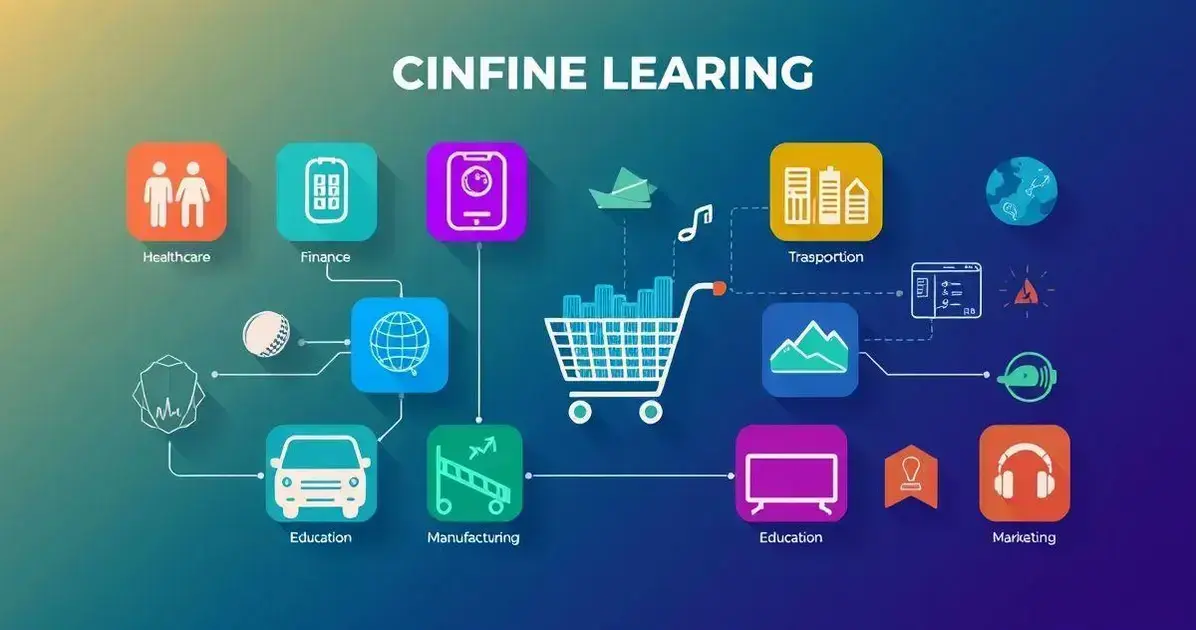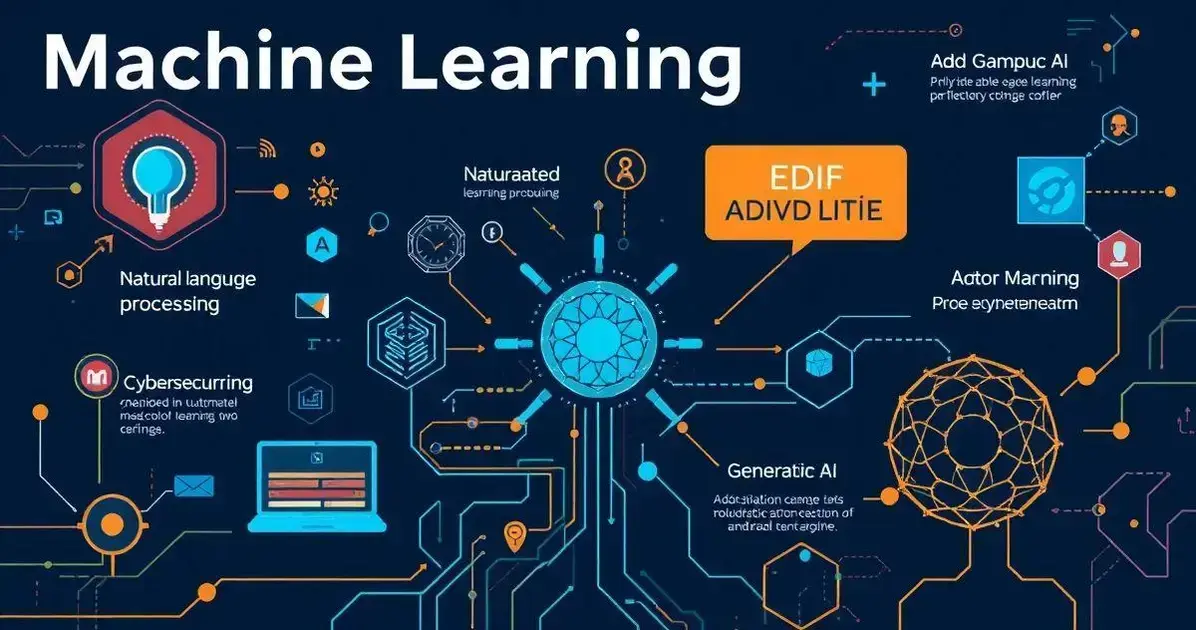Machine learning in artificial intelligence is more than just a buzzword—it’s the engine that powers some of the smartest technologies around us. From personalized movie suggestions to real-time fraud detection, it’s quietly shaping the way we live, work, and interact with the world.
Behind every breakthrough in AI, there’s a system learning from data, spotting patterns, and getting smarter with every interaction. It’s not about magic—it’s about math, models, and a whole lot of processing power.
Curious to see how this all works and why it matters so much right now? Keep reading and discover how machine learning is changing the game in AI.
Understanding Machine Learning Basics
Understanding machine learning in artificial intelligence lays the foundation for grasping how it integrates with broader AI systems. At its core, machine learning is a subset of AI that focuses on teaching computers to learn from data.
Instead of being explicitly programmed for every task, machine learning algorithms use data to identify patterns and make decisions. This self-learning capability allows machines to improve their performance over time.
Key Concepts of Machine Learning
There are several fundamental concepts to understand when diving into machine learning:
- Supervised Learning: This involves training a model on labeled data, helping it make predictions based on new, unseen inputs. For example, a model trained to identify cat images learns from a dataset of categorized images.
- Unsupervised Learning: In contrast, this technique deals with unlabelled data, enabling the model to discover hidden patterns without pre-defined labels. It’s great for clustering and grouping data.
- Reinforcement Learning: This approach teaches machines to make decisions through trial and error, receiving rewards or penalties based on actions in a given environment.
Why Machine Learning Matters
The significance of machine learning in artificial intelligence lies in its ability to analyze large datasets quicker than any human could. From predicting consumer behavior to diagnosing diseases, its applications are vast and impactful.
By harnessing machine learning, businesses can unlock insights that drive efficiency, innovation, and competitive advantage.
The Role of Machine Learning in AI
Machine learning in artificial intelligence plays a crucial role in the broader field of AI. By supplying systems with the ability to learn from data, it empowers AI applications to evolve and enhance their performance over time. In essence, machine learning is the driving force behind many innovations and improvements in AI.
How Machine Learning Enhances AI
Machine learning algorithms allow AI systems to interpret large sets of data, which they can use to identify patterns and relationships. This enhances decision-making and optimizes operations across various industries.
Types of Machine Learning Used in AI
There are different types of machine learning that contribute to AI:
- Supervised Learning: This type helps algorithms learn from labeled datasets, improving their ability to make accurate predictions or classifications.
- Unsupervised Learning: This allows AI to explore and identify patterns in data without predefined labels, effectively grouping similar data points.
- Reinforcement Learning: Here, an AI learns by trial and error, receiving positive or negative feedback based on its actions in a given environment.
The Impact of Machine Learning on AI Applications
Machine learning in artificial intelligence significantly enhances the capabilities of AI applications in various fields such as healthcare, finance, and entertainment.
For instance, in healthcare, machine learning algorithms analyze medical data to assist in diagnoses and treatment plans. In finance, these algorithms predict market trends, helping analysts make informed decisions.
Future of Machine Learning in AI
As technology advances, the role of machine learning in AI will only grow. Emerging fields such as deep learning and natural language processing rely heavily on machine learning techniques to drive innovation. As these technologies continue to develop, they promise to redefine what AI can achieve.
Applications of Machine Learning in Various Fields

Machine learning in artificial intelligence has transformed numerous fields, bringing innovative solutions and enhancing processes across various industries. Here are some notable applications of machine learning:
Healthcare
In the healthcare sector, machine learning is used to predict patient outcomes and assist in diagnosing diseases. Algorithms analyze patient data to identify patterns, enabling early detection of conditions like cancer and heart disease.
Finance
Machine learning applications in finance help in fraud detection and risk assessment. By analyzing transaction patterns, algorithms can identify suspicious activities in real-time and protect consumers from potential threats.
Retail
In retail, machine learning enhances customer experience by providing personalized recommendations. Algorithms analyze purchase history and browsing behavior, helping retailers suggest products that customers are likely to buy.
Transportation
Machine learning is also significant in transportation, where algorithms optimize traffic flow and improve route planning. Ride-sharing apps use machine learning to match riders with drivers efficiently, reducing wait times.
Manufacturing
In manufacturing, machine learning predicts equipment failures before they occur, minimizing downtime. By analyzing data from machinery, companies can schedule maintenance activities proactively.
Entertainment
Streaming services like Netflix and Spotify leverage machine learning to analyze user preferences. This analysis helps suggest content that matches viewers’ or listeners’ tastes, enhancing user engagement.
Education
In education, machine learning customizes learning experiences for students. Adaptive learning platforms assess individual student performance and provide tailored educational resources.
Marketing
Across all these sectors, machine learning in artificial intelligence plays a pivotal role in driving progress, enabling smarter systems, and delivering more personalized, efficient, and proactive solutions.
Benefits of Machine Learning in Business
Machine learning in artificial intelligence brings a range of benefits to businesses, enabling them to operate more effectively and make informed decisions. Here are some key advantages:
Improved Efficiency
Machine learning automates repetitive tasks, allowing employees to focus on more strategic initiatives. By handling data entry, customer support, and monitoring, businesses can save time and reduce human error.
Data-Driven Insights
With the ability to analyze vast amounts of data, machine learning provides valuable insights. It helps businesses understand customer behavior, market trends, and operational efficiencies, leading to smarter decision-making.
Enhanced Customer Experience
Machine learning enables personalized experiences for customers. By analyzing preferences and behaviors, businesses can tailor recommendations and marketing strategies to fit individual needs, improving customer satisfaction.
Predictive Analytics
With predictive analytics, businesses can anticipate future trends and behaviors. This allows for proactive planning and optimized inventory management, which can ultimately drive profitability.
Cost Reduction
By streamlining operations and improving efficiency, machine learning can significantly reduce costs. Companies can allocate resources more effectively and focus on areas that generate the most value.
Competitive Advantage
Incorporating machine learning in artificial intelligence gives businesses an edge in the market. It facilitates innovation and agility in adapting to changes, allowing companies to stay ahead of their competition.
Fraud Detection
Machine learning aids in identifying fraudulent activity by analyzing patterns in data. This helps businesses in finance and other industries safeguard against potential threats and losses.
Scalability
As a business grows, machine learning systems can easily scale to manage increasing amounts of data and complexity. This flexibility allows businesses to expand without sacrificing quality or efficiency.
Challenges Faced in Machine Learning
While machine learning offers significant advantages, it also presents several challenges that businesses must navigate. Here are some common obstacles:
Data Quality and Quantity
Machine learning models rely heavily on data. Poor quality data can lead to inaccurate predictions. Businesses must ensure they have enough high-quality data for effective training and validation of their models.
Complexity of Implementation
Integrating machine learning into existing systems can be complex and requires technical expertise. Organizations may face difficulties in understanding how to deploy models effectively and monitor their performance over time.
Bias in Algorithms
Machine learning algorithms can inadvertently learn biases present in training data. This can lead to unfair or discriminatory outcomes, which may harm a company’s reputation and customer trust.
Interpretability of Models
Many machine learning models, especially complex ones like deep learning, can be seen as “black boxes”. Their decision-making processes are not always transparent, making it hard for users to understand their predictions.
Scalability Issues
As data volume grows, ensuring algorithms can scale effectively becomes challenging. Businesses must continuously assess their infrastructure to support larger datasets without sacrificing performance.
Resource Intensity
Training machine learning models can be resource-heavy in terms of computing power and time. Organizations need to allocate sufficient resources to manage and scale machine learning initiatives.
Continuous Learning
Machine learning models must adapt to new data over time to remain effective. This requires ongoing monitoring and retraining, which can be resource-intensive and complicated.
Privacy Concerns
Using large datasets often raises privacy issues, particularly in sensitive areas like healthcare. Companies must navigate regulations and ensure they handle data responsibly to protect user privacy.
Future Trends in Machine Learning

The future of machine learning holds exciting possibilities that can reshape industries and enhance our daily lives. Here are some key trends to watch for:
Integration with Edge Computing
As devices become smarter and more interconnected, machine learning will increasingly be integrated with edge computing. This allows data processing to occur closer to the source, leading to faster decisions and reduced latency, which is crucial for applications like autonomous vehicles.
Advancements in Natural Language Processing (NLP)
Machine learning will see significant improvements in natural language processing, making human-computer interaction more seamless. This will enhance customer service tools, chatbots, and virtual assistants, allowing for more intuitive communication.
Explainable AI
As machine learning becomes more complex, there is a growing demand for explainable AI. This involves creating models that not only provide results but also offer insights into how and why decisions are made. This transparency will be vital for sectors like finance and healthcare.
Automated Machine Learning (AutoML)
Automated machine learning tools will become more prevalent, enabling non-experts to build and deploy machine learning models efficiently. This democratizes AI and allows businesses of all sizes to leverage data without needing deep technical expertise.
AI in Cybersecurity
Machine learning will play a critical role in enhancing cybersecurity measures. AI algorithms can analyze patterns and detect anomalies, providing real-time protection against potential threats and intrusions.
Personalization through Machine Learning
As data collection improves, machine learning will enable even greater levels of personalization across various platforms. Businesses will deliver tailored experiences to customers based on individual preferences and behaviors.
Generative AI
Generative AI, which uses machine learning to create new content, will gain traction. This includes generating images, writing text, or producing music, opening up new creative possibilities and applications.
Sustainable AI Practices
As awareness of environmental issues grows, there will be a push for sustainable AI practices. This involves creating energy-efficient algorithms and utilizing machine learning to optimize resource consumption in various sectors.
FAQ – Frequently Asked Questions about Machine Learning in Artificial Intelligence
What is machine learning?
Machine learning is a subset of artificial intelligence that allows computers to learn from data and improve their performance over time without being explicitly programmed.
How can businesses benefit from machine learning?
Businesses can automate tasks, gain valuable insights from data, personalize customer experiences, and improve decision-making processes through machine learning.
What programming languages should I learn for machine learning?
Python and R are the most popular programming languages for machine learning due to their ease of use and the extensive libraries available.
What are some real-world applications of machine learning?
Real-world applications include healthcare diagnostics, fraud detection in finance, personalized recommendations in retail, and predictive maintenance in manufacturing.
What challenges can I face when implementing machine learning?
Challenges include data quality, complexity of implementation, bias in algorithms, and the need for ongoing maintenance and updates.